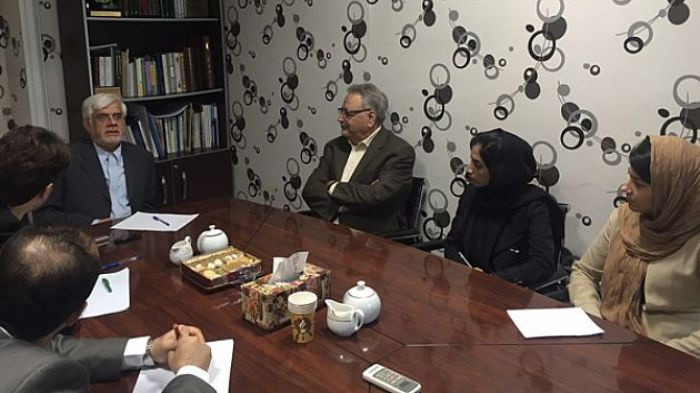Top Reformist Candidate Lays Out the Next Parliament’s Foreign Policy Agenda

On April 21, 2016, we met Mohammad-Reza Aref in his modest office in Jamalzadeh Street, central Tehran. The 64-year old Aref, Stanford graduate, top MP-elect in Tehran's parliamentary elections and one of the two front-runners for the position of parliament's spokesmanship, discussed a wide range of topics, from the nuclear deal, to human rights, to the next parliament's relation with the government.
Pointing to the request by three Republican congressmen in February to visit Iran to monitor the parliamentary elections, Aref said that legislators from other countries can visit Iran, but no preconditions are accepted. "We do not accept intervention by any foreign country," he said. "Independence is a key slogan of the Islamic Republic of Iran, and no power has been able to change that throughout these years." Aref emphasized that despite differences, all Iranian political groups agree on that principle.
Former Minister of Telecommunications also touched on human rights, where the West's focus has shifted after disputes over the nuclear program were settled down last summer. "It was predictable that Western countries would turn towards human rights after the JCPOA (Joint Comprehensive Plan of Action," after the nuclear deal he said, criticizing the West's "political treatment" of human rights. "If we take one step back, they will come two steps forward," he asserted. The state of human rights in Iran is better than, and not even comparable with, other regional states Aref added.
While admitting the deep-rooted skepticism among Iranians towards the West, he added that "we are living in a world where interaction with other countries is of ultimate importance". Meanwhile, he reminded that Iran will never allow others to dictate their demands over the country. Aref stressed that for Iran, diplomatic priority lies in dispelling misunderstanding and developing ties firstly with Muslim countries and secondly with members of the ECO, Economic Cooperation Organization (a regional bloc whose members include Iran, Turkey, Central Asian countries, plus Pakistan, Azerbaijan, and Afghanistan). "ECO, specially countries who are part of Iran's 'civilizational sphere' have always been important" he said. "Turkey has outperformed us in this area."
Aref also addressed the buzzword of Iranian politics since last summer, JCPOA, or as it is known by its Persian acronym in Iran, BARJAAM. "Before the nuclear negotiations, a negative atmosphere was created against Iran. This pessimism was the root cause of all [United Nations'] resolutions," he said. "The most important achievement of JCPOA was building trust with the world."
Aref did not forget to discuss the role of the parliament in the post-JCPOA era. After stepping down in 2013 presidential elections in favor of Hassan Rouhani, Aref successfully tested his popularity in February 2015 elections, and as head of the List of Hope slate, a combination of Reformists and moderate Principlist figures, he gained more than 1,600,000 votes to enter Majles, the Iranian parliament, as Tehran's frontrunner candidate. "The parliament should help to turn expectations into reality, and push for the West to fulfill its promises," Aref stated. "We would fail if the parliament decides to treat JCPOA in partisan manner. We are a partner to the government, not its rival," he added, while wishing that the Tenth Parliament, which will inaugurate in late May, does not follow the 'extremist' model of its predecessor.

